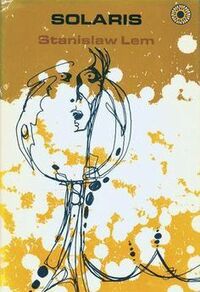Take a photo of a barcode or cover
adventurous
dark
emotional
mysterious
reflective
tense
slow-paced
Plot or Character Driven:
A mix
Strong character development:
Complicated
Loveable characters:
Complicated
Diverse cast of characters:
Yes
Flaws of characters a main focus:
Complicated
mysterious
reflective
sad
slow-paced
Plot or Character Driven:
N/A
Strong character development:
No
Loveable characters:
No
Diverse cast of characters:
No
Flaws of characters a main focus:
Yes
Loss never truly heals, we carry it with us always.
This book is conceptually-driven, which is great for sci-fi and those sections really worked for me (What does it mean to make first contact with a being so vastly different from yourself that there is no consensus on whether it is alive much less has a conciousness? How would you even know?), but it is also inextricably anchored in human emotion. Maybe the characters and relationships are kept a bit blank purposefully so that you can overlay your own experiences, but I felt distanced instead. The emotional segments didn't feel fully impactful because I didn't feel like I knew enough of the history between Kelvin and Hareyor the development between Kelvin and Solaris!Harey. Ultimately I felt the pain, isolation, melancholy, and regret... but faintly. I wanted to feel it more.
Every character is stuck inside their own heads, haunted by their own traumas, an impermeable wall between themselves and others that keeps them from healing, echoed by their isolation inside Solaris station... and ultimately echoing my reading experience being unable to connect with Kelvin. Fuck, is it genius after all?
Also, this feels nit-picky of me, because the passages were so brief when compared to the whole book, but the way women's bodies were described made me uncomfortable (racially stereotyped and objectifying). It felt unnecessary... the descriptions weren't sensual (not like the beautiful description of peach fuzz on a cheek) nor even sexual, just lurid in an otherwise quite chaste novel. I couldn’t see what those two passages--one describing Gibarian's memory woman's breasts and buttocks, the other describing Harey's nipple seen through her dress-- contributed and felt the book would have been the same had they been left out.
Besides that, I loved the gorgeous visuals. Lem creates an alien landscape of colour and shape where the mind inescapably finds familiarity in the strange. Before reading I found the cover art with the ocean that mimics bedsheets rather strange, but it clicks for me now.
Curious to know how exactly this translation differs from the one translated from the french version, but I didn't love it enough that I want to read both.
Excited to watch the movie (movies? at least the Tarkovsky) now.
This book is conceptually-driven, which is great for sci-fi and those sections really worked for me (What does it mean to make first contact with a being so vastly different from yourself that there is no consensus on whether it is alive much less has a conciousness? How would you even know?), but it is also inextricably anchored in human emotion. Maybe the characters and relationships are kept a bit blank purposefully so that you can overlay your own experiences, but I felt distanced instead. The emotional segments didn't feel fully impactful because I didn't feel like I knew enough of the history between Kelvin and Harey
Every character is stuck inside their own heads, haunted by their own traumas, an impermeable wall between themselves and others that keeps them from healing, echoed by their isolation inside Solaris station... and ultimately echoing my reading experience being unable to connect with Kelvin. Fuck, is it genius after all?
Also, this feels nit-picky of me, because the passages were so brief when compared to the whole book, but the way women's bodies were described made me uncomfortable (racially stereotyped and objectifying). It felt unnecessary... the descriptions weren't sensual (not like the beautiful description of peach fuzz on a cheek) nor even sexual, just lurid in an otherwise quite chaste novel. I couldn’t see what those two passages
Besides that, I loved the gorgeous visuals. Lem creates an alien landscape of colour and shape where the mind inescapably finds familiarity in the strange. Before reading I found the cover art with the ocean that mimics bedsheets rather strange, but it clicks for me now.
Curious to know how exactly this translation differs from the one translated from the french version, but I didn't love it enough that I want to read both.
Excited to watch the movie (movies? at least the Tarkovsky) now.
Graphic: Suicide attempt
Moderate: Suicidal thoughts, Suicide, Grief
Minor: Racism, Blood, Fire/Fire injury
A fascinating, concise sci-fi thought piece on the concept of first contact. What if, in straining to learn more about an extraterrestrial subject, it reflects back our own subconscious? Solaris wastes no time in setting up exactly this scene, with the most emotion-laden memories of the space station's crew plucked out and made manifestly real once again. Over and over and over again. Is this an attempt at an olive branch offering during first communication by a sentience that does not understand humanity, or a vengeful act of psychological torture against a civilization marked by egotistical hubris? Maybe that depends on your perspective.
Reading Solaris now, after a rich foundation in science fiction, was quite interesting. So many works in the pop culture lexicon mine material from this short book that envisioned - well before men walked on the moon - the impact on the human condition of a future beyond our solar system.
Reading Solaris now, after a rich foundation in science fiction, was quite interesting. So many works in the pop culture lexicon mine material from this short book that envisioned - well before men walked on the moon - the impact on the human condition of a future beyond our solar system.
Romanzo molto bello, ma dal ritmo che, per voler essere ipnotico, finisce col diventare un po' troppo lento.
Solaris foi o primeiro livro do gênero que eu li e confesso que tive dificuldade para absorver algumas coisas.
O livro passeia entre a filosofia e ficção científica, o que me pegou um pouco e tornando o último tópico um tanto desgastante por conta dos diversos textos acadêmicos solarísticos e ao invés de entender um pouco mais sobre Solaris eu fiquei foi perdida e sinto que construí uma pequena lacuna totalmente em branco (provavelmente irei reler esse livro).
Tirando esse pequeno incômodo, a história é realmente interessante pois tudo o que envolve o oceano inteligente é realmente curioso, principalmente porque ele é capaz de desenvolver formas do imaginário humano e ao longo do tempo ele evoluí e cria "hóspedes" para os habitantes da estação, pessoas que em algum momento foram importantes na vida dos três cientistas que ali restam e que já não estão mais vivas. Me pergunto se o oceano sabia do fardo que todos ali iriam carregar com esses "hóspedes" ou se talvez estivesse dando uma chance para que eles pudessem viver uma vida diferente do que foi no passado, talvez um presente? Jamais saberei a verdade.
Não vou ficar filosofando mas gostaria de acrescentar que a discussão psicológica que o livro aborda também me fez perceber que o ser humano tem a capacidade de ir longe descobrir do zero outros mundos, mas não é humilde o suficiente para olhar dentro de si mesmo, dentro do seu próprio mundo e reparar seus próprios problemas.
O livro passeia entre a filosofia e ficção científica, o que me pegou um pouco e tornando o último tópico um tanto desgastante por conta dos diversos textos acadêmicos solarísticos e ao invés de entender um pouco mais sobre Solaris eu fiquei foi perdida e sinto que construí uma pequena lacuna totalmente em branco (provavelmente irei reler esse livro).
Tirando esse pequeno incômodo, a história é realmente interessante pois tudo o que envolve o oceano inteligente é realmente curioso, principalmente porque ele é capaz de desenvolver formas do imaginário humano e ao longo do tempo ele evoluí e cria "hóspedes" para os habitantes da estação, pessoas que em algum momento foram importantes na vida dos três cientistas que ali restam e que já não estão mais vivas. Me pergunto se o oceano sabia do fardo que todos ali iriam carregar com esses "hóspedes" ou se talvez estivesse dando uma chance para que eles pudessem viver uma vida diferente do que foi no passado, talvez um presente? Jamais saberei a verdade.
Não vou ficar filosofando mas gostaria de acrescentar que a discussão psicológica que o livro aborda também me fez perceber que o ser humano tem a capacidade de ir longe descobrir do zero outros mundos, mas não é humilde o suficiente para olhar dentro de si mesmo, dentro do seu próprio mundo e reparar seus próprios problemas.
mysterious
slow-paced
Plot or Character Driven:
Character
Strong character development:
No
Loveable characters:
No
Diverse cast of characters:
Complicated
Flaws of characters a main focus:
Yes
challenging
dark
emotional
mysterious
reflective
sad
medium-paced
Plot or Character Driven:
Character
Strong character development:
Complicated
Loveable characters:
N/A
Diverse cast of characters:
No
Flaws of characters a main focus:
Yes
Excellent book. I loved the mystery and found the book surprisingly creepy and atmospheric. Made you think a lot about our place in the universe and how humans try and cement their place in all things. The ending was both very sad and reflective.
Only gripe is that the pseudoscience sections were a little too much at times and detracted from the story. They were also very heavy sections to the point where it started to feel a bit pretentious.
Only gripe is that the pseudoscience sections were a little too much at times and detracted from the story. They were also very heavy sections to the point where it started to feel a bit pretentious.
adventurous
challenging
mysterious
reflective
slow-paced
slow-paced
Really interesting story and concepts. A lot of original ideas. But the prose (I know it's a translation) really harms the story. Numerous parts read like a chemistry textbook, sometimes for pages at a time. We get more studies than we do character. I'm still rating it decently high because the abstract of the book is fantastic, however its execution... not so much.




